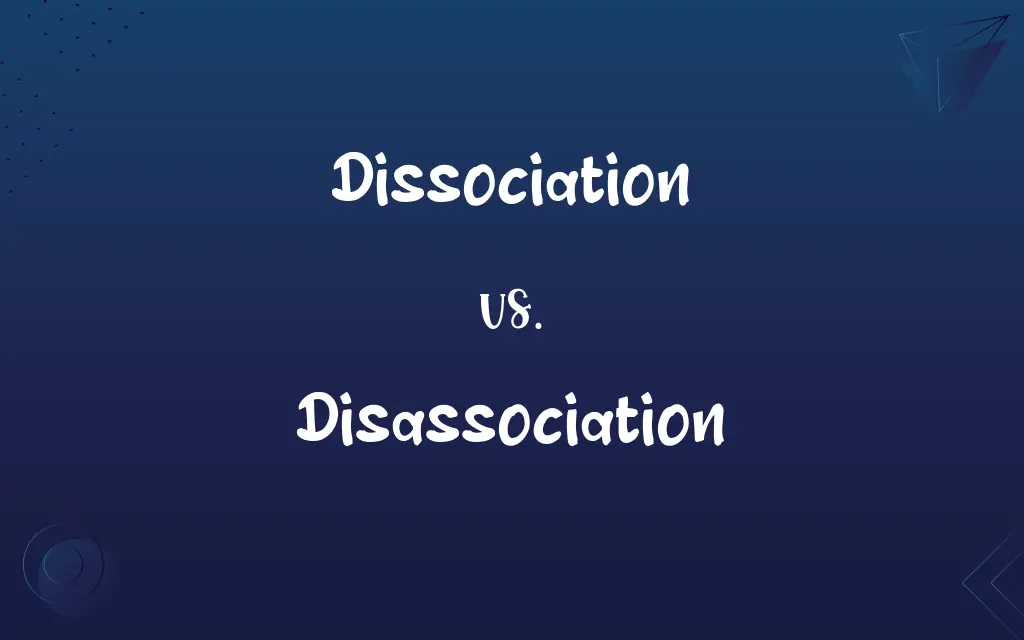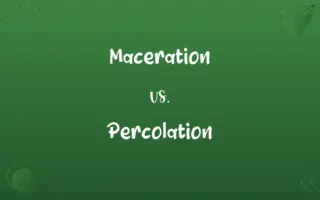Dissociation vs. Disassociation: Know the Difference

By Shumaila Saeed & Hifza Nasir || Published on August 23, 2024
Dissociation is a psychological process causing a disconnect in thought, awareness, or identity, while disassociation is a broader term for separating or detaching from something.

Key Differences
Dissociation is primarily used within psychological contexts to describe a phenomenon where an individual experiences a disconnection from their thoughts, memories, feelings, actions, or sense of identity. Disassociation, on the other hand, is a general term that refers to the act of separating or detaching from something.
Shumaila Saeed
Aug 23, 2024
Dissociation is often a coping or defense mechanism in response to trauma or stress, allowing the mind to distance itself from experiences that are too intense to integrate with conscious awareness. Disassociation can describe a wide range of separations, from social or political affiliations to the disconnection of ideas, groups, or entities.
Shumaila Saeed
Aug 23, 2024
The distinction between the two terms lies in their application and specificity. Dissociation is a specific clinical term used to describe a psychological process that can affect an individual's perception of reality and sense of self. Disassociation, while sometimes used interchangeably with dissociation in everyday language, generally pertains to a broader, more varied process of separation or detachment.
Shumaila Saeed
Aug 23, 2024
In the realm of psychology, understanding the nuances between dissociation and disassociation is crucial, as it helps in accurately describing the experiences and symptoms of individuals. Outside of psychological contexts, disassociation is often the preferred term for indicating various forms of separation or disengagement from relationships, organizations, or concepts.
Hifza Nasir
Aug 23, 2024
The use of dissociation in psychological assessment and therapy is important for diagnosing and treating dissociative disorders. Meanwhile, disassociation can be relevant in discussions about social dynamics, organizational behavior, and even personal decision-making processes, where detachment or separation from certain affiliations or beliefs may be discussed.
Dua Fatima
Aug 23, 2024
ADVERTISEMENT
Comparison Chart
Definition
A psychological process resulting in a disconnect in thoughts, memory, identity, or perception.
The act of separating or detaching from something.
Shumaila Saeed
Aug 23, 2024
Context
Primarily used in psychology and mental health.
Used in a broader range of contexts.
Shumaila Saeed
Aug 23, 2024
Specificity
Specific to describing a mental health phenomenon.
More general, not limited to psychological contexts.
Shumaila Saeed
Aug 23, 2024
Examples
Dissociative identity disorder, dissociative amnesia.
Cutting ties with a political party, distancing oneself from a former belief system.
Hifza Nasir
Aug 23, 2024
Application
Describes a defense mechanism or symptom of trauma.
Describes a wide range of separation processes.
Hifza Nasir
Aug 23, 2024
ADVERTISEMENT
Implications
Often implies a coping strategy for dealing with stress or trauma.
Can imply a conscious choice or natural progression of detaching.
Shumaila Saeed
Aug 23, 2024
Dissociation and Disassociation Definitions
Dissociation
A mental process of disconnecting from one’s thoughts or identity.
After the accident, she experienced dissociation from her surroundings.
Shumaila Saeed
Mar 05, 2024
Disassociation
The act of detaching or separating oneself from a group or idea.
She chose disassociation from the organization due to ethical concerns.
Hifza Nasir
Mar 05, 2024
Dissociation
Can result in a sense of detachment from reality.
Dissociation during stressful events helps him cope with the pressure.
Dua Fatima
Mar 05, 2024
Disassociation
Not limited to psychological phenomena.
The company’s disassociation from its former CEO was a strategic move.
Dua Fatima
Mar 05, 2024
ADVERTISEMENT
Dissociation
Often a response to trauma.
Trauma survivors may use dissociation as a defense mechanism.
Dua Fatima
Mar 05, 2024
Disassociation
Can involve physical or conceptual detachment.
Moving to a new city was part of his disassociation from the past.
Dua Fatima
Mar 05, 2024
Dissociation
Can manifest in various dissociative disorders.
Dissociative identity disorder involves a pronounced form of dissociation.
Shumaila Saeed
Mar 05, 2024
Disassociation
Can be used in social or political contexts.
His disassociation from the party was a public statement.
Shumaila Saeed
Mar 05, 2024
Dissociation
Involves a disruption of normal integration of consciousness.
Dissociation can lead to gaps in memory and perception.
Shumaila Saeed
Mar 05, 2024
Disassociation
Implies a broader range of separation activities.
Disassociation from harmful habits contributes to better mental health.
Shumaila Saeed
Mar 05, 2024
Dissociation
The process by which the action of a solvent or a change in physical condition, as in pressure or temperature, causes a molecule to split into simpler groups of atoms, single atoms, or ions.
Shumaila Saeed
Mar 05, 2024
Dissociation
(chemistry) the temporary or reversible process in which a molecule or ion is broken down into smaller molecules or ions
Shumaila Saeed
Mar 05, 2024
Dissociation
The act of dissociating or the condition of having been dissociated.
Shumaila Saeed
Mar 05, 2024
Disassociation
A state in which some integrated part of a person's life becomes separated from the rest of the personality and functions independently
Shumaila Saeed
Mar 05, 2024
Dissociation
The act of dissociating or disuniting; a state of separation; disunion.
Shumaila Saeed
Mar 05, 2024
Disassociation
The state of being unconnected in memory or imagination;
I could not think of him in disassociation from his wife
Shumaila Saeed
Mar 05, 2024
Dissociation
A state in which some integrated part of a person's life becomes separated from the rest of the personality and functions independently
Hifza Nasir
Mar 05, 2024
Repeatedly Asked Queries
Can dissociation be a healthy coping mechanism?
In mild forms, such as daydreaming, dissociation can be a normal coping mechanism. However, persistent or severe dissociation may require clinical attention.
Shumaila Saeed
Aug 23, 2024
How is dissociation diagnosed and treated?
Dissociation is diagnosed through clinical assessment, and treatment may include therapy, medication, or a combination of both, depending on the severity and underlying causes.
Hifza Nasir
Aug 23, 2024
Can someone experience both dissociation and disassociation simultaneously?
Yes, an individual could psychologically dissociate from traumatic memories while also choosing to disassociate from situations or relationships that trigger those memories.
Shumaila Saeed
Aug 23, 2024
What is the key difference between dissociation and disassociation?
Dissociation is a psychological process causing a mental disconnect, while disassociation refers to the act of separating or detaching from something or someone.
Hifza Nasir
Aug 23, 2024
Are there any positive aspects of disassociation?
Disassociation can be positive when it involves distancing oneself from harmful or toxic influences, leading to personal growth and healthier environments.
Shumaila Saeed
Aug 23, 2024
Is disassociation always a conscious decision?
Disassociation can be both a conscious decision, like cutting ties with a group, or an unconscious process, such as gradually losing touch with former beliefs.
Shumaila Saeed
Aug 23, 2024
How can understanding dissociation help in mental health treatment?
Understanding dissociation helps in identifying symptoms of dissociative disorders, providing appropriate treatment, and supporting individuals in integrating their experiences.
Shumaila Saeed
Aug 23, 2024
Can disassociation affect group dynamics?
Yes, disassociation from a group or idea can change social networks and dynamics, impacting group cohesion and individual relationships.
Shumaila Saeed
Aug 23, 2024
What strategies are effective in managing dissociation?
Strategies may include grounding techniques, therapy to address underlying trauma, and developing healthy coping mechanisms.
Hifza Nasir
Aug 23, 2024
What role does trauma play in dissociation?
Trauma is a key factor in many cases of dissociation, as the mind seeks to protect itself from the full impact of traumatic experiences by detaching from them.
Hifza Nasir
Aug 23, 2024
Share this page
Link for your blog / website
HTML
Link to share via messenger
About Author
Written by
Shumaila SaeedShumaila Saeed, an expert content creator with 6 years of experience, specializes in distilling complex topics into easily digestible comparisons, shining a light on the nuances that both inform and educate readers with clarity and accuracy.
Co-written by
Hifza Nasir








































































